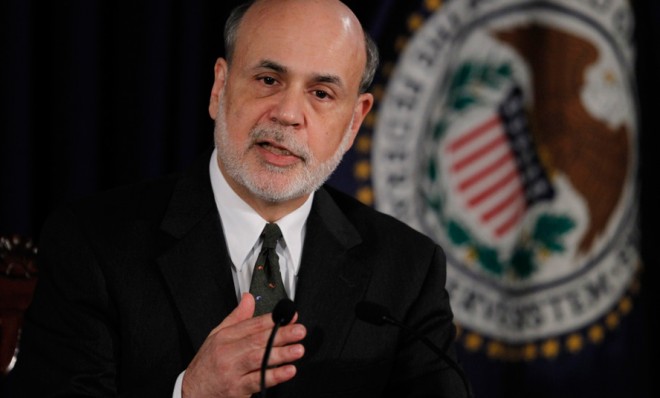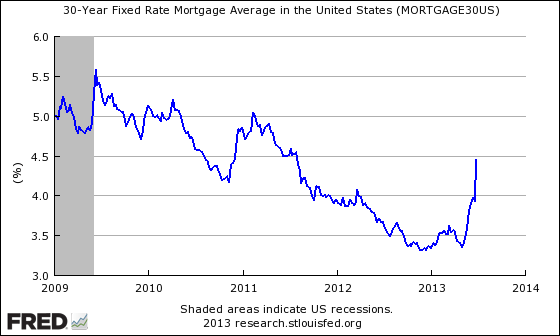Will rising mortgage rates kill the recovery?
Interest rates on home loans have shot up more than a full percentage point in the last two months

A free daily email with the biggest news stories of the day – and the best features from TheWeek.com
You are now subscribed
Your newsletter sign-up was successful

Mortgage rates have shot up more than 1 percentage point since early May, including a jump of half a percentage point since Ben Bernanke addressed the media on June 19 to provide some more answers about how and when the Federal Reserve would pull back on its monetary stimulus program. Those spiking rates have fueled concern that the Fed's recent signals — or the market's reaction to them — could undercut the economy and, in particular, a key area that Bernanke pointed to as driving the recovery: housing.
Asked at his press conference to explain why the Fed's economic and labor market forecasts were relatively optimistic, Bernanke said the economic fundamentals were looking better.
"In particular," he said, "the housing sector, which has been a drag on growth since the crisis, is now, obviously, a support to growth. It's not only creating construction jobs, but as house prices rise, increased household wealth supports consumption spending, consumer sentiment."
The Week
Escape your echo chamber. Get the facts behind the news, plus analysis from multiple perspectives.

Sign up for The Week's Free Newsletters
From our morning news briefing to a weekly Good News Newsletter, get the best of The Week delivered directly to your inbox.
From our morning news briefing to a weekly Good News Newsletter, get the best of The Week delivered directly to your inbox.
Could those benefits disappear now that the average rate for a 30-year fixed mortgage has jumped to 4.46 percent?

As economist Kris Dawsey and Hui Shan of Goldman Sachs noted recently in a research note to clients, rising mortgage rates could weigh on GDP growth both directly and indirectly, as Bernanke outlined. The direct impact would come as the result of slowing home sales and construction activity. In response to a 1 percentage point rise in mortgage rates, they project that housing starts could fall by about 11 percent over four quarters.
The indirect effects could result from any slump in home prices and refinancing activity, which might cause consumers to tighten their purse strings if they start to feel poorer.
The recent jump in rates, the Goldman economists write, represents an increase of about $100 in the monthly mortgage payment for a median-priced single-family home with a 20 percent down payment — or about 2.5 percent of pre-tax median household income.
A free daily email with the biggest news stories of the day – and the best features from TheWeek.com
So what kind of crimp could higher mortgage rates put on GDP growth? The Goldman Sachs analysis suggests the answer is a fairly small one: about two-tenths of a percentage point over the next year. "Importantly," they write, "the recent increase in mortgage rates has been only one part of a broader tightening in financial conditions ― including a stronger dollar and lower stock prices ― that might be expected to subtract around 0.4 percentage point from real GDP growth over the next year." That hit to the economy, they suggest, is "meaningful but not insurmountable."
By contrast, as Bernanke himself pointed out, the economic drag from federal fiscal policy — including tax rate hikes on top earners, the expiration of a payroll tax holiday and the automatic budget cuts of the sequester — will cut about 1.5 percentage points of GDP this year, according to CBO projections.
Economists at the Federal Reserve Bank of San Francisco last month estimated that, over the next three years, "federal budgetary policy could restrain economic growth by as much as 1 percentage point annually beyond the normal fiscal drag that occurs during recoveries."
Compared with those projections, the effect of a 1 percentage-point jump in mortgage rates is likely to be modest. Bernanke himself suggested at his press conference that the housing recovery could withstand higher interest rates, as consumer expectations of continued gains in home prices help sustain demand even with higher rates.
Goldman's economists did note that their projections come with considerable uncertainty:
"On the one hand, factors other than housing affordability ― such as origination capacity constraints and borrower credit quality issues ― are at present probably more important constraints than they have been historically. As a result, the sensitivity of housing indicators to changes in mortgage rates may be lower than historical estimates suggest. On the other hand, for technical reasons the nature of our statistical analysis may understate the magnitude of the potential impact."
If the Goldman Sachs estimates are accurate, though, the economy won't suffer tremendously even if the days of sub-4 percent rates on 30-year mortgages are gone.
More from The Fiscal Times...
-
 Labor secretary’s husband barred amid assault probe
Labor secretary’s husband barred amid assault probeSpeed Read Shawn DeRemer, the husband of Labor Secretary Lori Chavez-DeRemer, has been accused of sexual assault
-
 Trump touts pledges at 1st Board of Peace meeting
Trump touts pledges at 1st Board of Peace meetingSpeed Read At the inaugural meeting, the president announced nine countries have agreed to pledge a combined $7 billion for a Gaza relief package
-
 Britain’s ex-Prince Andrew arrested over Epstein ties
Britain’s ex-Prince Andrew arrested over Epstein tiesSpeed Read The younger brother of King Charles III has not yet been charged